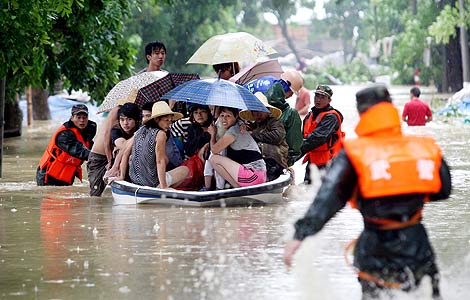Undue taxes reflect on local govts' pressure
Updated: 2013-08-17 19:44
(Xinhua)
|
||||||||
JINAN - Unwelcome taxes recently exposed all across China are symptomatic of the financial burden that local governments are forced to shoulder against the backdrop of a slowing economy and spiraling debt.
A recent audit from eastern coastal province of Shandong showed that 40 enterprises from 11 counties had been overcharged 573 million yuan ($92 millon) land utilization and value added taxes by the end of 2012.
Six other enterprises had been prematurely levied taxes worth 144 million yuan.
Companies in northern Hebei province and southern Guangdong complained that they had been levied taxes that they should not have paid or were supposed to be paid in the next fiscal year.
Statistics from the China Iron and Steel Association showed that 80 of its members were supposed to pay 89 billion yuan taxes in 2012, but actually paid 98.4 billion yuan.
A number of reasons lie behind these malpractices by tax authorities: Local government pursuit of higher revenues is a major cause, according to Liu Shangxi, deputy director of the Research Institute for Fiscal Science, at the Ministry of Finance.
"Many local governments have aggressively pursued fiscal revenues and demanded increments in tax income, so the tax authorities have done whatever they could (to levy taxes)," Liu said.
China's economy has shown signs of slowdown since last year, bringing local governments under pressure to reduce their expenses.
Figures released by the Ministry of Finance show China's tax revenue totalled 6.94 trillion yuan in the first seven months this year, up 8.5 percent year-on-year. However, the growth is 0.5 percentage point lower from the same period last year.
In such circumstances, local government debt has become a grave concern in China.
An audit conducted in 2011 by the National Audit Office (NAO) found that local government debt totaled 10.7 trillion yuan at the end of 2010, more than 26 percent of gross domestic product.
In early June this year, the NAO said a follow-up audit found total debt of 3.85 trillion yuan owned by 36 local governments by the end of 2012, up 12.9 percent from 2010.
Illegitimate taxes can temporarily increase fiscal revenues of local governments but, in the long term, they harm enterprises and inhibit the establishment of a healthy tax system.
Liu believes local governments should better manage their expenses rather than charge these taxes to deal with their fiscal burdens.
Ma Yao, an analyst from the market researcher CIConsulting, said the central government should adjust the evaluation mechanism for local governments so as to eradicate such phenomena.
- Higher cigarette taxes make people drink less
- Tax official suspended amid property investigation
- Tax-relieving policies to extend to Shanghai's Hi-Tech Park
- Nation may start taxing more luxury goods, official says
- Chinese tourists remain top tax-free spenders
- Clarity on tax evasion needed, lawmakers told
Most Viewed
Editor's Picks

|

|

|

|

|

|
Today's Top News
China trims US Treasury holdings in June
Pentagon hails defense chief's visit
China, US impacts Asian economies differently
Debt crisis unlikely in short term: Think tank
Error puts Shanghai bourse in a spin
Ferry sinks in Philippines killing 24
CSRC blames Everbright Securities for spike
SAFE denies intense capital outflow
US Weekly

|

|















